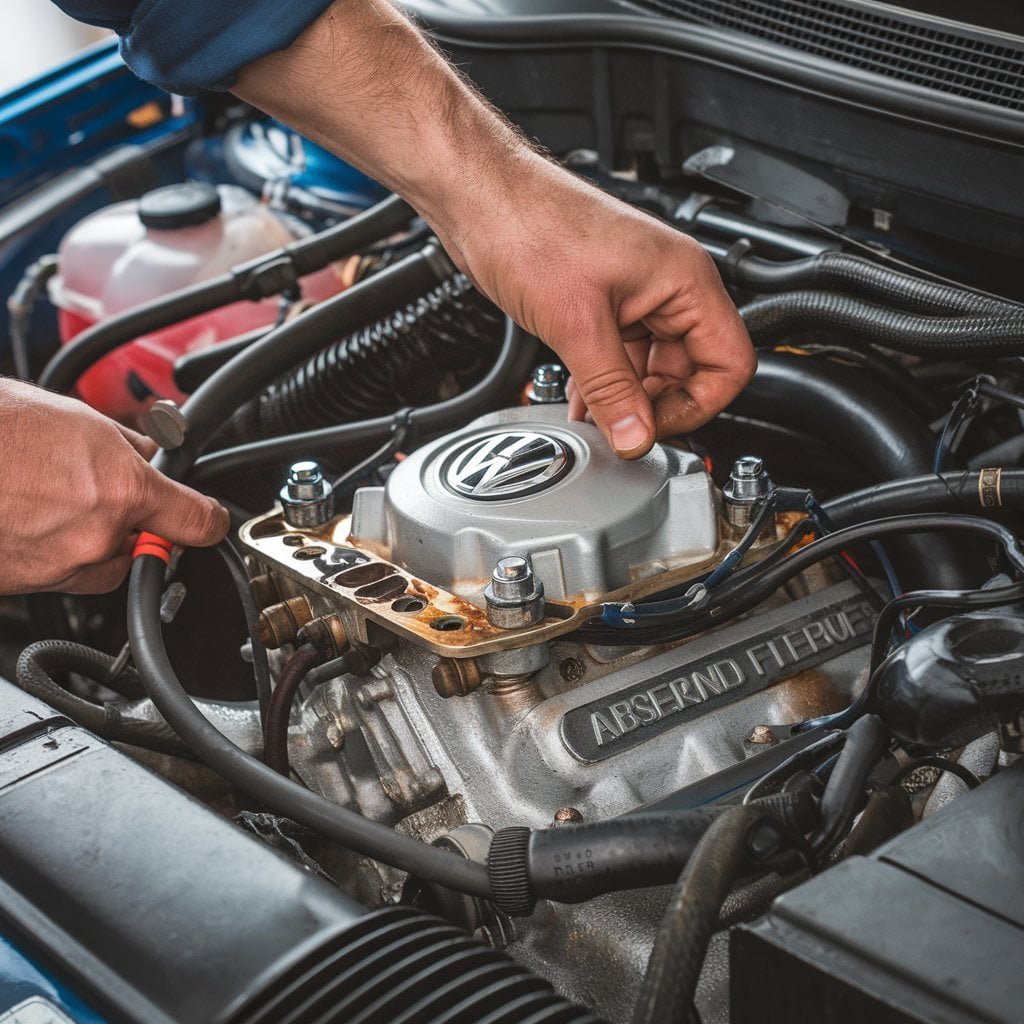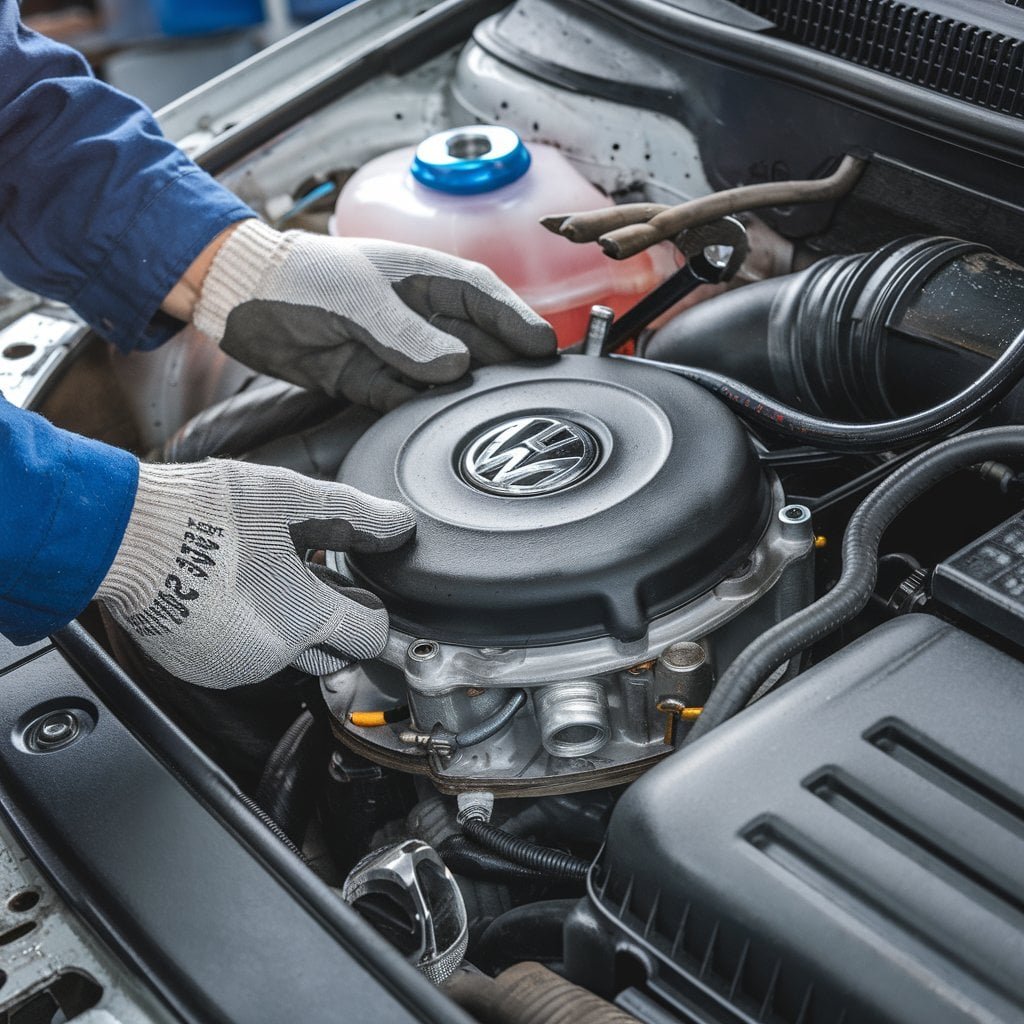Is your VW Passat ABS module malfunctioning, causing the ABS warning light to stay on or your brakes to feel unresponsive? Ignoring ABS issues can increase stopping distances by up to 30% on wet roads, putting your safety at risk. The ABS control module is the brain of your braking system, ensuring stability and preventing skidding during sudden stops. If it fails, your braking performance suffers, and your vehicle might not pass the Dubai RTA inspection. At our Volkswagen repair center in Dubai, we specialize in VW Passat ABS module repair, offering precise diagnostics, expert repairs, and OEM replacements to restore your braking efficiency. Book your repair today and get a 15% discount on ABS module services—drive safely without spending a fortune!

The ABS (Anti-lock Braking System) module in a VW Passat is a critical component that prevents wheel lock-up during braking, ensuring stability, traction, and steering control in emergency situations. It works in coordination with wheel speed sensors, the ABS pump, and the vehicle’s ECU (Engine Control Unit) to regulate braking pressure dynamically.
Many VW Passat owners misunderstand how the ABS control module works, leading to delayed repairs, safety risks, and expensive fixes. Below are six common myths about VW Passat ABS module repair and the truth behind them.
The ABS module prevents wheel lock-up and keeps the car stable during emergency braking. A faulty module can cause longer stopping distances, skidding, or unresponsive brakes. Even if the brakes seem fine, the anti-lock system won’t function when needed.
The ABS warning light in a VW Passat signals a problem in the braking system, ABS sensors, or control module. Ignoring it can cause complete ABS failure, leading to unstable braking and even failed RTA inspections in Dubai.
Many ABS module problems can be fixed without replacing the entire unit. Issues like corroded circuits, software errors, or faulty sensors can be repaired at a lower cost compared to full module replacement.
The ABS system improves braking on all road conditions, including dry pavement, sand, and turns. A faulty module reduces traction control and increases skidding risks regardless of weather conditions.
A failing ABS module can lead to damaged wheel speed sensors, hydraulic leaks, or brake system malfunctions. Delaying repairs can cause higher repair costs, reduced stability, and dangerous driving conditions.
The VW Passat ABS module works with Electronic Stability Control (ESC) to maintain vehicle control. If the ABS module fails, ESC may also stop working, making it harder to control the car during sudden turns or slippery conditions.
Ignoring ABS module problems can increase safety risks, reduce braking efficiency, and lead to costly repairs. A professional VW Passat ABS module repair service in Dubai can diagnose and fix issues, restoring safe braking performance in your Volkswagen Passat.

The need for VW Passat ABS module repair arises when the ABS system develops electrical, hydraulic, or sensor-related failures. Below are the main causes of ABS module problems.
A failing ABS module affects braking efficiency, traction control, and safety. Professional VW Passat ABS module repair helps restore smooth braking and prevents costly future repairs.
A faulty ABS module can cause braking malfunctions, loss of traction control, and safety risks. If you experience any of these symptoms, you may need VW Passat ABS module repair to restore proper braking performance.
The ABS light on the dashboard indicates a problem with the ABS module, wheel speed sensors, or hydraulic pump. If the light remains on, the system may be disabled, reducing braking efficiency.
A bad ABS module in a VW Passat can cause inconsistent brake pressure. If the pedal feels soft, delayed, or requires extra force, the ABS pump or solenoid valves may be failing.
The ABS module prevents wheel lock-up. If it fails, the wheels may lock up unexpectedly, increasing the risk of skidding and losing control on wet or uneven roads.
If the ABS system engages even at low speeds or under normal braking conditions, it may be due to a malfunctioning ABS module, faulty wheel speed sensors, or damaged wiring.
A damaged ABS pump motor can produce grinding, buzzing, or clicking noises while braking. This often indicates ABS pump failure or blocked hydraulic valves.
The ABS module in VW Passat works with Electronic Stability Control (ESC). If the module fails, the ESC system may also stop working, making the car unstable on slippery or sharp turns.
Ignoring these ABS issues can lead to serious brake failures, unstable driving, and costly repairs. If you notice any of these symptoms, schedule a professional VW Passat ABS module repair to fix the issue before it worsens.
Ignoring VW Passat ABS module issues can lead to braking failure, stability control loss, and expensive repairs. The ABS system prevents wheel lock-up and keeps the car stable during emergency braking. A faulty ABS module can make your vehicle unsafe to drive.
A faulty ABS module affects braking safety, vehicle stability, and legal compliance. If you notice ABS warning lights, braking delays, or wheel lock-ups, get a professional VW Passat ABS module repair to avoid serious problems.
If your VW Passat ABS module is faulty, delaying repairs can lead to brake failure, longer stopping distances, and expensive replacements. At our Volkswagen repair center in Dubai, we provide expert ABS diagnostics, repairs, and replacements at market-competitive prices.
The prices listed above are estimates and may vary based on your VW Passat model, ABS module condition, and repair requirements. For an accurate quote, contact us today. We provide detailed diagnostics and a transparent cost breakdown before proceeding with any repairs. Book Your VW Passat ABS Module Repair in Dubai Today – Drive Safely with a Fully Functional ABS System!

Trust our team of Expert Volkswagen Mechanics at our Volkswagen Service Center in Dubai for all your Volkswagen Repair and service needs.
Our Top-Notch Volkswagen Service Center in Dubai have the advanced diagnostic tools and Volkswagen experts to accurately identify and resolve any issues with your Volkswagen.
With over 1200+ Volkswagen repaired, our Volkswagen Service Center in Dubai is the trusted Garage for comprehensive and expert Volkswagen Repair services.
Most of the vehicles get damaged just because of maintenance neglect you take
The ABS module should be repaired if the issue is caused by electrical faults, software errors, or minor sensor malfunctions. A full ABS module replacement is required when the module has severe circuit board damage, burnt components, or internal hydraulic failure. A proper ABS diagnostic scan will determine whether repair or replacement is needed.
While your VW Passat will still function, driving with a damaged ABS module is unsafe. The ABS system prevents wheel lock-up and skidding, especially during emergency braking or on slippery roads. A faulty ABS module means you may lose traction control and braking stability, increasing the risk of accidents.
The ABS module can overheat due to continuous operation, poor ventilation, electrical surges, or a malfunctioning ABS pump. Excess heat can damage internal circuits and cause the module to fail prematurely, requiring ABS module repair or replacement.
Yes, in Dubai, the RTA vehicle inspection considers an active ABS warning light as a safety issue. If your ABS module is faulty and the warning light is on, your car may fail the inspection, preventing registration renewal until the problem is fixed.
Yes, after a battery replacement, the ABS module may need reprogramming or recalibration. A sudden loss of power can cause the ABS system to reset incorrectly, leading to faulty error codes or braking inconsistencies. A professional ABS module reset can fix this issue.
Yes, a short circuit in the ABS module can cause continuous power draw, even when the car is turned off. This can lead to battery drain, starting issues, and electrical malfunctions. If your battery dies frequently, the ABS module should be checked.
The ABS system does not require regular maintenance, but it should be inspected if warning lights appear, braking performance changes, or during major servicing. It is recommended to check the ABS module, wheel speed sensors, and hydraulic pump every 60,000 – 80,000 km or if any braking issues occur.
“Talk to a Volkswagen Expert Now by booking a call, and get personalised solutions for your Volkswagen unique needs and requirements.”
+971564646081
